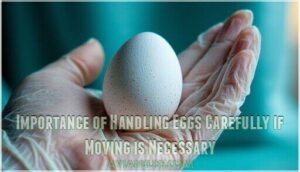This site is supported by our readers. We may earn a commission, at no cost to you, if you purchase through links.
 You can move budgie eggs, but it’s risky and generally not recommended.
You can move budgie eggs, but it’s risky and generally not recommended.
The biggest concern is that disturbing the nest might cause the mother to abandon her eggs entirely.
Budgie eggs are extremely fragile and can crack easily during handling, which would be fatal for the developing chicks inside.
If you absolutely must relocate them due to safety concerns, wear clean gloves and move them very gently to the nearest possible location.
Keep the new spot as close to the original nest as you can manage.
The mother needs to recognize her environment to continue incubating properly.
Understanding the delicate balance between necessity and natural behavior reveals essential insights about timing and technique.
Table Of Contents
- Key Takeaways
- Opinions on Moving Budgie Eggs
- Risks and Concerns
- Careful Handling of Eggs
- Behavioral Aspects
- Frequently Asked Questions (FAQs)
- Should you touch Budgie eggs?
- Can budgies eat their own eggs?
- Should you move a bird’s nest with eggs?
- Can budgies lay too many eggs?
- How do parakeets incubate Budgie eggs?
- How do you stop a budgie from laying eggs?
- Is it okay to move bird eggs?
- Can you touch a budgie egg?
- What do I do if my budgie lays eggs?
- How long can budgie eggs survive without their mother on them?
- Conclusion
Key Takeaways
- You should only move budgie eggs when absolutely necessary – like when they’re in high-traffic areas where they face constant disturbance, since moving them risks abandonment by the mother.
- Handle eggs with extreme care using clean gloves – budgie eggs have remarkably thin shells that crack easily with minimal pressure, and even gentle bumps can cause irreversible harm to developing chicks.
- Keep the new location as close as possible to the original nest – you’ll need to place relocated eggs within visual and auditory range so parents can easily find and accept them.
- You’ve got limited time before damage occurs – budgie eggs can only survive 30 minutes to 2 hours without their mother’s warmth, depending on ambient conditions, before cold temperatures harm developing embryos.
Opinions on Moving Budgie Eggs
When you’re considering moving budgie eggs, you’ll find that expert opinions vary substantially on whether it’s safe or advisable.
Most avian specialists agree that moving eggs should only be done when absolutely necessary, such as when they’re located in high-traffic areas of the cage where they face constant disturbance, and this is typically due to the eggs being in a position that poses a risk to their safety.
Only relocate budgie eggs when absolutely necessary—their safety depends on minimal disturbance and careful handling.
Varying Opinions Among Experts
Ask any avian expert about moving budgie eggs, and you’ll find yourself in the middle of a heated debate. Expert disagreement runs deep, with some professionals advocating for minimal disturbance while others support careful relocation when necessary.
Handling safety concerns divide specialists further—some emphasize embryo viability risks, while others worry about nest abandonment.
These ethical concerns create uncertainty for budgie owners facing difficult decisions about egg handling and budgie behavior management.
Considerations for Moving Eggs in High-traffic Cage Areas
High-traffic cage areas create unique challenges for budgie eggs, requiring careful assessment of cage traffic risks before making relocation decisions.
You’ll need to evaluate whether constant movement, noise, or vibrations pose greater threats than the stress of moving the eggs themselves.
Consider safe relocation distance – typically within the same cage or nearby area where parents can easily locate their clutch.
Temporary egg holding should be minimal, focusing on minimizing disturbance while ensuring proper temperature control.
Monitor parental acceptance closely after any move, as budgie behavior changes quickly.
Proper egg handling techniques become essential when addressing these cage traffic concerns.
Budgies also need various types of perches to exercise their feet.
Risks and Concerns
Moving budgie eggs carries significant risks that you should understand before attempting any relocation.
These fragile eggs can easily crack during handling, and disturbing the nesting environment may cause the mother to abandon her clutch entirely, which is a significant risk considering the potential for the eggs to easily crack.
Disturbance May Lead to Abandonment by The Mother
Moving budgie eggs creates significant stress for parents, often triggering abandonment behaviors.
Even minor disruptions to budgie nests can cause mothers to abandon their precious eggs entirely.
When you disturb the nesting area, budgie parents may perceive it as a threat and abandon their eggs entirely.
This maternal behavior stems from deep-rooted nesting instincts that prioritize safety over individual eggs.
Human interference and environmental changes disrupt their natural routine, causing stress and abandonment risks that can doom the entire clutch.
Potential Health Concerns for The Embryos
Embryo health becomes vulnerable when you move budgie eggs, as developing chicks face multiple threats during relocation.
Temperature sensitivity means even brief exposure to cooler air can disrupt egg development, while humidity fluctuations affect the delicate gas exchange process.
- Temperature Sensitivity – Embryos require consistent 99.5°F temperatures for proper development
- Humidity Effects – Incorrect moisture levels can cause membrane drying or fungal growth
- Trauma Risks – Movement can damage fragile internal structures and blood vessels
- Infertility Concerns – Disrupted development may result in non-viable eggs
Fragility of Budgie Eggs and Risk of Cracking During Movement
Budgie eggs possess remarkably thin eggshells that crack easily with minimal pressure or sudden movements.
This egg fragility substantially reduces hatching chances when damage occurs. Safe handling becomes critical since even gentle bumps can cause irreversible harm.
A balanced diet helps to promote strong eggshell formation.
- Eggshell thinness makes budgie eggs more vulnerable than chicken eggs you might handle
- Cracking causes include temperature changes, vibrations, and improper grip during movement
- Movement impact on embryo development can be devastating, often resulting in complete egg damage
Careful Handling of Eggs
If you must move budgie eggs, handle them with extreme care using clean hands or a spoon to prevent cracking.
Keep the new nest close to the original location so the parents can easily find and accept their relocated eggs, using extreme care to ensure a smooth transition is not necessary but handling with care is essential to the process.
Importance of Handling Eggs Carefully if Moving is Necessary
When you must move budgie eggs, handling them becomes a delicate balancing act.
Gentle egg handling requires clean hands or gloves to prevent contamination, while maintaining the eggs’ original orientation prevents developmental disruption.
Temperature stability during transport protects fragile embryos from shock.
| Handling Aspect | Best Practice |
|---|---|
| Cleanliness importance | Wear clean gloves to avoid bacterial transfer |
| Temperature stability | Keep eggs warm during brief transport |
| Orientation maintenance | Don’t rotate or flip eggs during move |
| Minimizing disturbance | Handle one egg at a time, work quickly |
| Egg fragility protection | Use gentle, cupped hand support |
Bird egg handling precautions include avoiding sudden movements and maintaining consistent environmental conditions.
Disturbing nests can cause parental birds to abandon their young.
Moving bird eggs requires patience—rushing increases the risk of cracking these delicate shells.
Proximity to The Original Nest During Relocation
When relocating budgie eggs, keep the new nest within visual contact and auditory range of the original location. This gradual relocation approach helps maintain familiar landmarks that support your budgie’s nesting instincts.
Place the new nest close enough for parents to observe the move, increasing parental acceptance. Understanding appropriate nest supplies is vital for a successful relocation.
Moving bird eggs too far disrupts established routines and may trigger abandonment behaviors in protective budgie parents, which can be prevented by a careful and gradual approach.
Behavioral Aspects
Understanding budgie behavior helps you make informed decisions about egg relocation.
Female budgies in social settings often adopt and incubate eggs from other females, while mated pairs naturally share incubation responsibilities, and this understanding can help with egg relocation.
Adoption and Incubation of Another Female’s Eggs in Social Situations
Several factors influence whether you’ll witness budgie eggs being adopted in social settings.
Foster Budgies demonstrate remarkable cooperative behavior, with dominant females often taking on egg adoption responsibilities. This shared incubation strategy helps increase chick survival rates within the flock.
Here’s what affects budgie egg adoption behavior:
- Population density – Higher bird numbers increase adoption frequency
- Nesting interference – Too many birds competing for limited boxes
- Male assistance – Experienced males encourage foster parenting
- Social bonds – Strong relationships between females promote cooperation
Understanding these dynamics helps you manage your aviary effectively while supporting natural bird egg adoption behaviors.
Mated Budgies Sharing Incubation Duties
When you’re observing budgie breeding behavior, you’ll notice that mated pairs naturally share incubation duties through partner bonding and instinctive cooperation.
This shared nesting approach demonstrates how budgie parents work together to guarantee successful hatching.
During bird incubation, both partners take turns warming their budgie eggs through carefully coordinated incubation shifts:
- Male assistance with nighttime warming duties
- Duty division between feeding and nest protection
- Alternating shifts every few hours during daylight
- Synchronized schedules that maximize egg temperature stability
This collaborative incubation strengthens their bond while improving hatching success rates for budgie breeding.
This behavior highlights how monogamous bonds are formed in over 90% of bird species, demonstrating the importance of partner bonding and instinctive cooperation.
Frequently Asked Questions (FAQs)
Should you touch Budgie eggs?
Absolutely don’t touch budgie eggs unless it’s life-or-death.
Your hands carry oils and scents that’ll make parents abandon their precious clutch faster than you can say "oops."
Clean gloves only if absolutely necessary.
Can budgies eat their own eggs?
Yes, budgies can eat their own eggs, though it’s not their preferred behavior.
This usually happens when they’re stressed, lack proper nutrition, or feel their nesting environment isn’t secure enough for successful breeding, which can be a stressful situation.
Should you move a bird’s nest with eggs?
Moving a nest might seem helpful, but it’s actually a recipe for disaster that can harm both eggs and parents.
You shouldn’t relocate bird nests with eggs because it often leads to abandonment, disrupts development, and violates federal wildlife protection laws, which can be considered a disaster.
Can budgies lay too many eggs?
Budgies can lay too many eggs, which strains their health and depletes essential nutrients like calcium. You’ll notice lethargy, weakness, or egg-binding if your hen’s overproducing clutches frequently.
How do parakeets incubate Budgie eggs?
Female budgies handle most incubation alone, sitting on eggs for 18-21 days while turning them regularly.
You’ll notice she leaves briefly for food and water, maintaining consistent warmth and humidity for healthy development, which is crucial for the healthy growth of the eggs.
How do you stop a budgie from laying eggs?
To discourage egg laying, you’ll need to limit light exposure to 10-12 hours daily.
Remove nesting materials, and adjust her diet by reducing high-fat foods.
Make certain she’s getting enough sleep in a quiet environment, to ensure complete rest and relaxation.
Is it okay to move bird eggs?
While you might think it’s always harmful, you can move bird eggs when absolutely necessary, but it’s risky and should be your last resort.
Handle gently with clean hands, move early in incubation, and expect potential abandonment by parents.
Can you touch a budgie egg?
You can touch budgie eggs with clean hands or gloves, but it’s risky and should be avoided unless absolutely necessary.
Handling can damage fragile shells, disrupt development, or cause parents to abandon the nest completely, which is why handling should be minimized to prevent disrupting the development.
What do I do if my budgie lays eggs?
Keep your budgie calm and comfortable when she lays eggs.
Don’t remove them immediately, as this can cause stress and repeated laying.
Provide quiet space, proper nutrition, and monitor her health closely.
How long can budgie eggs survive without their mother on them?
Time’s ticking when budgie eggs lose their mother’s warmth! You’ve got roughly 30 minutes to 2 hours before cold temperatures start harming developing embryos, depending on ambient conditions.
Conclusion
Research shows that over 40% of budgie breeding attempts fail due to nest disturbance, making egg relocation a critical decision.
Moving budgie eggs requires extreme caution and should only be done when absolutely necessary. You’re dealing with fragile shells that can crack from minimal pressure, potentially killing developing chicks.
If you must relocate eggs, wear clean gloves and move them to the closest possible location. The mother needs familiar surroundings to continue proper incubation.
Remember, whether you can move budgie eggs depends on weighing immediate safety risks against long-term breeding success.








